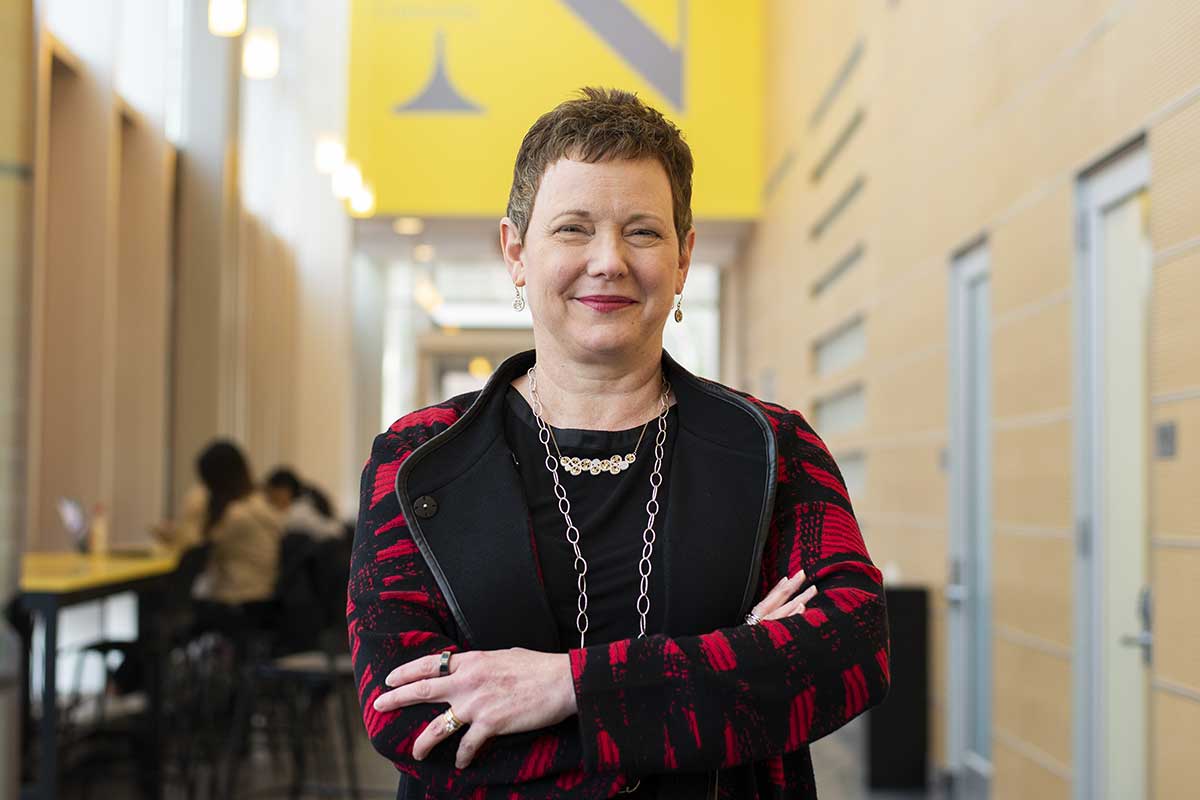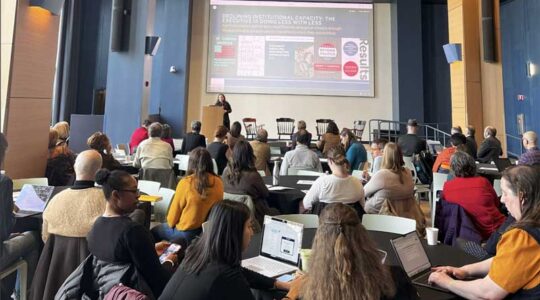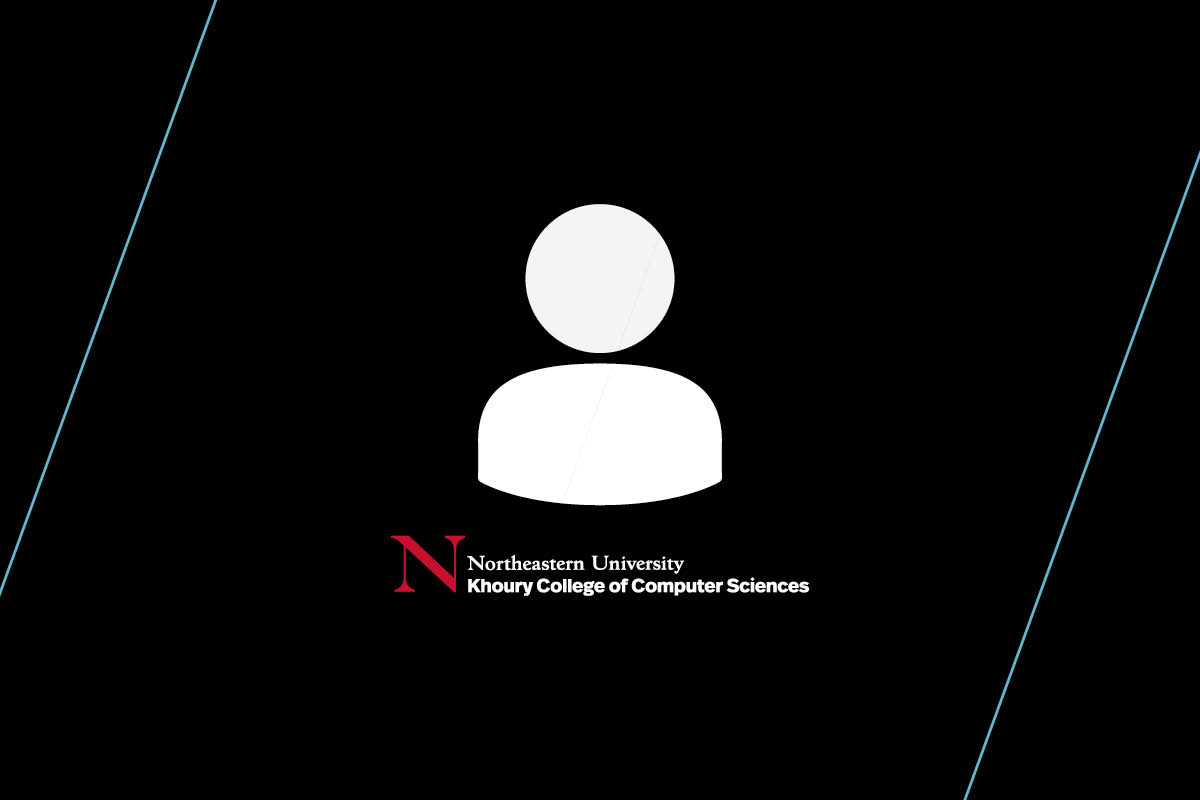Elizabeth Mynatt
(she/her)
Dean of Khoury College of Computer Sciences

Research interests
- Health informatics
- Human computer interaction
- Ubiquitous computing
Education
- PhD in Computer Science, Georgia Institute of Technology
- MS in Computer Science, Georgia Institute of Technology
- BS in Computer Science, summa cum laude, North Carolina State University
Biography
Elizabeth Mynatt is the Dean of Khoury College of Computer Sciences. She joined Northeastern University in January 2022 after a 23-year career at Georgia Institute of Technology (Georgia Tech), where she most recently served as Regents’ and Distinguished Professor in the College of Computing and executive director of the Institute of People and Technology.
Mynatt is an internationally recognized expert in the areas of ubiquitous computing and assistive technologies. Her research contributes to ongoing advances in personal health informatics, computer-supported collaborative work, and human-centered computing.
In her research Mynatt directed the Everyday Computing Lab at Georgia Tech. There she investigated the design of health and information technologies to support breast cancer patients during their journey using personalized mobile technologies.
Mynatt also was one of the leading researchers in the Aware Home Research Initiative, that investigated future home technology designs that enable aging adults to continue to live independently. Mynatt is also senior investigator with Emory’s Cognitive Empowerment Program and co-PI for the NSF AI-CARING Institute, both with the goal of creating longitudinal, interactive AI technologies to empower older adults and their care networks.
Mynatt was elected as a member of the American Academy of Arts and Sciences in 2024. She serves as member of the National Academies Computer Science and Telecommunications Board (CSTB) and the NSF Directorate for Computer, Information Science & Engineering Advisory Committee (CISE AC). She has been recognized as a member of the ACM SIGCHI Academy, and a Sloan and Kavli research fellow. Mynatt is the past Chair of the Computing Community Consortium, an NSF-sponsored effort to engage the computing research community in envisioning more audacious research challenges.
Mynatt has published more than 100 scientific papers, led grants from the NSF and NIH, and chaired the CHI 2010 conference, the premier international conference in human-computer interaction. In 2015 she became a Fellow of the Association of Computing Machinery (ACM) for contributions to human-centered computing and the development of health information technologies. Mynatt was elected as an American Association for the Advancement of Science (AAAS) Fellow in 2021 for exceptional computing community leadership and for distinguished leadership and contributions to human-centered computing, with a focus on assistive technologies, wellness, and health. Her article, “Charting past, present, and future research in ubiquitous computing,” published in 2000, has been cited over 2000 times. She has also been quoted or featured in major publications including the Washington Post, National Geographic, and The Wall Street Journal.
Mynatt earned her Bachelor of Science summa cum laude in computer science from North Carolina State University and her Master of Science and Ph.D. in computer science from Georgia Tech. Prior to joining the Georgia Tech faculty in 1998, Mynatt was a member of the research staff at Xerox PARC.
Recent publications
-
A Research Through Design Study on AI Explanations for Collaborative Everyday Tasks for Older Adults Aging in Place
Citation: Niharika Mathur, Tamara Zubatiy, Elizabeth D. Mynatt. (2025). A Research Through Design Study on AI Explanations for Collaborative Everyday Tasks for Older Adults Aging in Place GROUP Companion, 48-53. https://doi.org/10.1145/3688828.3699640 -
Vital Insight: Assisting Experts’ Sensemaking Process of Multi-modal Personal Tracking Data Using Visualization and LLM
Citation: Jiachen Li, Justin Steinberg, Xiwen Li, Akshat Choube, Bingsheng Yao, Dakuo Wang, Elizabeth D. Mynatt, Varun Mishra . (2024). Vital Insight: Assisting Experts' Sensemaking Process of Multi-modal Personal Tracking Data Using Visualization and LLM CoRR, abs/2410.14879. https://doi.org/10.48550/arXiv.2410.14879 -
Navigating the Paradox: Challenges and Strategies of University Students Managing Mental Health Medication in Real-World Practices
Citation: Jiachen Li, Justin Steinberg, Elizabeth D. Mynatt, Varun Mishra . (2024). Navigating the Paradox: Challenges and Strategies of University Students Managing Mental Health Medication in Real-World Practices CoRR, abs/2408.07784. https://doi.org/10.48550/arXiv.2408.07784 -
Categorizing Sources of Information for Explanations in Conversational AI Systems for Older Adults Aging in Place
Citation: Niharika Mathur, Tamara Zubatiy, Elizabeth D. Mynatt. (2024). Categorizing Sources of Information for Explanations in Conversational AI Systems for Older Adults Aging in Place CoRR, abs/2406.05111. https://doi.org/10.48550/arXiv.2406.05111 -
AI-CARING: National AI Institute for Collaborative Assistance and Responsive Interaction for Networked Groups
Citation: Sonia Chernova, Elizabeth D. Mynatt, Agata Rozga, Reid G. Simmons, Holly A. Yanco. (2024). AI-CARING: National AI Institute for Collaborative Assistance and Responsive Interaction for Networked Groups AI Mag., 45, 124-130. https://doi.org/10.1002/aaai.12162 -
A Distributed Cognition Approach to Understanding Compensatory Calendaring Cognitive Systems of Older Adults with Mild Cognitive Impairment and Their Care Partners
Citation: Tamara Zubatiy, Kayci L. Vickers, Jessica L. Saurman, Felicia Goldstein, Amy D. Rodriguez, Niharika Mathur, Elizabeth D. Mynatt. (2023). A Distributed Cognition Approach to Understanding Compensatory Calendaring Cognitive Systems of Older Adults with Mild Cognitive Impairment and Their Care Partners UCAmI (1), 190-201. https://doi.org/10.1007/978-3-031-48306-6_19 -
“Why Did You Say That?”: Understanding Explainability in Conversational AI Systems for Older Adults with Mild Cognitive Impairment (MCI)
Citation: Niharika Mathur, Tamara Zubatiy, Agata Rozga, Elizabeth D. Mynatt. (2023). "Why Did You Say That?": Understanding Explainability in Conversational AI Systems for Older Adults with Mild Cognitive Impairment (MCI) UCAmI (1), 208-214. https://doi.org/10.1007/978-3-031-48306-6_21 -
“Mango Mango, How to Let The Lettuce Dry Without A Spinner?”: Exploring User Perceptions of Using An LLM-Based Conversational Assistant Toward Cooking Partner
Citation: Szeyi Chan, Jiachen Li, Bingsheng Yao, Amama Mahmood, Chien-Ming Huang , Holly Jimison, Elizabeth D. Mynatt, Dakuo Wang. (2023). "Mango Mango, How to Let The Lettuce Dry Without A Spinner?": Exploring User Perceptions of Using An LLM-Based Conversational Assistant Toward Cooking Partner CoRR, abs/2310.05853. https://doi.org/10.48550/arXiv.2310.05853 -
“I don’t know how to help with that” – Learning from Limitations of Modern Conversational Agent Systems in Caregiving Networks
Citation: Tamara Zubatiy, Niharika Mathur, Larry Heck, Kayci L. Vickers, Agata Rozga, Elizabeth D. Mynatt. (2023). "I don't know how to help with that" - Learning from Limitations of Modern Conversational Agent Systems in Caregiving Networks Proc. ACM Hum. Comput. Interact., 7, 1-28. https://doi.org/10.1145/3610170 -
Privacy vs. Awareness: Relieving the Tension between Older Adults and Adult Children When Sharing In-home Activity Data
Citation: Jiachen Li, Bingrui Zong, Tingyu Cheng, Yunzhi Li, Elizabeth D. Mynatt, Ashutosh Dhekne. (2023). Privacy vs. Awareness: Relieving the Tension between Older Adults and Adult Children When Sharing In-home Activity Data Proc. ACM Hum. Comput. Interact., 7, 1-30. https://doi.org/10.1145/3610202 -
“Always Nice and Confident, Sometimes wrong”: Developer’s Experiences Engaging Generative AI Chatbots Versus Human-Powered Q&A Platforms
Citation: Jiachen Li, Elizabeth D. Mynatt, Varun Mishra , Jonathan Bell. (2023). "Always Nice and Confident, Sometimes wrong": Developer's Experiences Engaging Generative AI Chatbots Versus Human-Powered Q&A Platforms CoRR, abs/2309.13684. https://doi.org/10.48550/arXiv.2309.13684 -
A Collaborative Approach to Support Medication Management in Older Adults with Mild Cognitive Impairment Using Conversational Assistants (CAs)
Citation: Niharika Mathur, Kunal Dhodapkar, Tamara Zubatiy, Jiachen Li, Brian Jones, Elizabeth D. Mynatt. (2022). A Collaborative Approach to Support Medication Management in Older Adults with Mild Cognitive Impairment Using Conversational Assistants (CAs) ASSETS, 42:1-42:14. https://doi.org/10.1145/3517428.3544830 -
Investigating Culturally Responsive Design for Menstrual Tracking and Sharing Practices Among Individuals with Minimal Sexual Education
Citation: Georgianna E. Lin, Elizabeth D. Mynatt, Neha Kumar. (2022). Investigating Culturally Responsive Design for Menstrual Tracking and Sharing Practices Among Individuals with Minimal Sexual Education CHI, 437:1-437:15. https://doi.org/10.1145/3491102.3501824 -
Pivoting an MCI Empowerment Program to Online Engagement
Citation: Elizabeth D. Mynatt, Kayci L. Vickers, Salimah LaForce, Sarah Farmer, Jeremy M. Johnson, Matthew Doiron, Aparna Ramesh, W. Bradley Fain, Tamara Zubatiy, Amy D. Rodriguez. (2022). Pivoting an MCI Empowerment Program to Online Engagement Proc. ACM Hum. Comput. Interact., 6, 32:1-32:26. https://doi.org/10.1145/3492851 -
Cultivating the Community: Inferring Influence within Eating Disorder Networks on Twitter
Citation: Fayika Farhat Nova, Amanda Coupe, Elizabeth D. Mynatt, Shion Guha, Jessica Pater. (2022). Cultivating the Community: Inferring Influence within Eating Disorder Networks on Twitter Proc. ACM Hum. Comput. Interact., 6, 7:1-7:33. https://doi.org/10.1145/3492826




